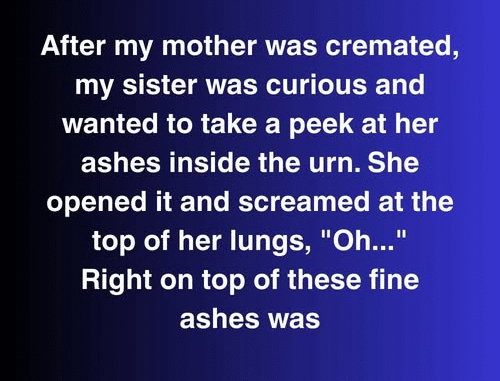
When my sister found a mysterious note in our mother’s ashes, it sent us on a journey to a secret house and a truth about our family that changed everything.
After Mom’s cremation, my sister, Lila, couldn’t resist peeking inside the urn. She gasped, “What…” A charred slip of paper, folded tightly, sat atop the ashes, its edges scorched. We stared, frozen. Lila gingerly lifted it out. The faded ink read: “If you find this, ask Clara about the cottage on Vía Sol. I’m sorry.”
I blinked, sure I’d misread. Clara was our aunt, Mom’s older sister, living hours away in Connecticut. They’d fallen out after Grandpa died, a rift never explained. We just knew they stopped speaking. “Vía Sol?” Lila whispered, eyes huge. “What’s that mean to you?” I shook my head. It rang a faint bell, but we lived in Maine—Vía Sol wasn’t local.
We tried Clara’s phone—voicemail. Lila and I decided to drive to her the next day, note in hand. The car ride buzzed with tension. Lila speculated, “A secret property? An inheritance?” I wasn’t hopeful—just uneasy. Mom’s last years with Alzheimer’s were rough. I handled most visits since I was closest, but her lucid moments often stung, calling me “too much like your father.”
We reached Clara’s by dusk. She answered in a worn cardigan, squinting like we’d interrupted her. “Took your mom’s ashes to visit?” she quipped. Lila, ever diplomatic, hugged her. “We found this in the urn.” Clara’s face tightened when she saw the note, now in a ziplock bag. She read it, sighed, and muttered, “That stubborn woman.”
“What’s Vía Sol?” I pressed. She poured coffee, sat us down, and began. “Ever hear of Culebra?” We hadn’t. “It’s a small island off Puerto Rico. Our family’s from there. Vía Sol’s a street in Dewey. There’s a tiny blue cottage, second from the end. Easy to miss.”
“Mom owned a place there?” Lila asked. Clara nodded. “Our dad left it to us both. After your mom married, she swore off Puerto Rico, called it ‘old family baggage.’ But that cottage holds stories.” She paused. “In ‘79, your mom ran there. Left your dad, me, everyone. Stayed six weeks. Came back… changed. Never told me why.”
We sat, stunned. Mom never hinted at this. Clara sipped her coffee. “I kept the place up, paid taxes. It’s been locked for decades. I’ve got the key.” Lila’s eyes lit up. “Can we see it?” Clara hesitated, then agreed. “Don’t expect it to talk.”
Four days later, we flew to Culebra. Vía Sol was narrow, vibrant, like a postcard left in the sun. The blue cottage was weathered, one window cracked, but it felt alive, like it held secrets. Inside, it smelled of salt and old wood. Faded curtains, a chipped mug, dusty books lined the shelves.
Lila called from the bedroom, “Come look!” A loose floorboard hid a metal box wrapped in cloth. Clara whispered, “She said she lost that.” Inside: letters bound in string, grainy photos, and a will from 1981, leaving the cottage to “whichever child understands.”
Lila unfolded a letter. It was from a man, Javier. Romantic at first, then pleading: “Tell me if the baby’s mine. I’ll stay if it is. If it’s his, I’m gone.” My heart sank. “Is this… about us?” The letters hinted Mom was pregnant that summer, but never named the father. Clara pointed to a photo—Javier, with warm eyes and curly hair. Not our dad.
“Do you think Dad knew?” Lila asked. I stayed silent. We checked records the next day. Mom and Clara co-owned the cottage; Mom paid taxes last in 2007, in cash. “She came back once,” Clara said softly.
We spent days tidying the cottage, sitting quietly. One evening, I walked to the beach alone, tears falling. I’d thought Mom was distant, unyielding. Maybe she was guarding a wound. Before leaving, Clara signed the cottage to us. “It’s not about the deed,” she said. “It’s her way of being remembered.”
Back home, I got a locket urn, placing a bit of Mom’s ashes inside. Lila and I planned to restore the cottage, maybe make it a community art space—something warm, healing. Months later, a woman, Sofia, messaged me via a family history site. She’d seen our cottage photo online, said she was Javier’s daughter. “We might be sisters,” she wrote.
A DNA test confirmed it: Javier was my father. Strangely, it didn’t hurt. It felt like release. I don’t know why Mom hid it—fear, guilt, or love tangled in silence. That cottage on Vía Sol gave us more than truth. It gave us a chance to know our roots, forgive the unspoken, and love Mom’s messy heart.
Sometimes ashes speak. If you listen, they tell you to keep going. Share this if you’ve ever found healing in a hidden story. 💙